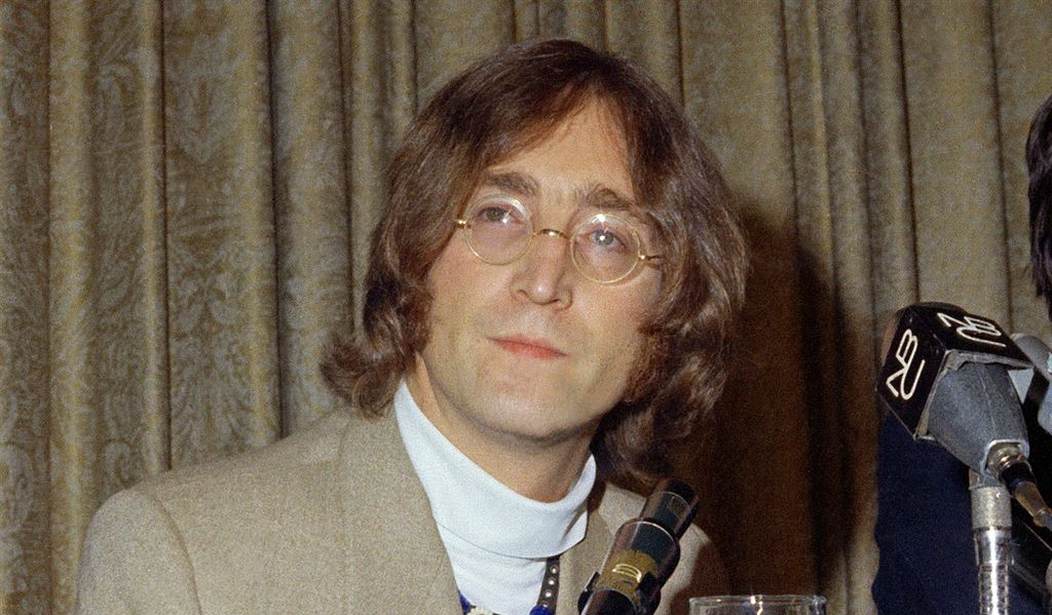I’ve always been interested in World War II, but really only the war in Europe. The war in the Pacific, though equally as important to world history, just never grabbed me. Maybe it’s because of the movies “Patton” and “Saving Private Ryan” and the lack of an equivalent movie in the other theater? I don’t really know why, it just is. The whole thing happened a lifetime before I was born, but something about it captured my imagination, which is how imagination works – you don’t have to have been a part of something for that something to be a part of you. Such is the case with John Lennon, who was murdered on this date in 1980.
The Beatles weren’t together in my lifetime, I’d just started forming lifelong memories when John was killed (though I have no memory of it because I was too young to know who he was). My parents were Elvis fans, anyway. But Beatles music, and John’s, has become as much a part of my life as it is to anyone screamed at the TV set watching The Ed Sullivan Show on February 9, 1964.
The Beatles were the very definition of a group; without any one of them there would not have been any of them. There was just something about them together, and that something carried each of them long after they broke up. Whether John was the “leader” or not is something some people still argue about to this day, but it is irrelevant. If Ringo Starr weren’t playing the drums, or George Harrison on guitar, or Paul McCartney on bass, John Lennon would be a retired factory worker somewhere.
Why did those four people together change music and, in many ways, the world? Books have been written about it, seminars held, someone is probably arguing on social media somewhere about it right now.
The question of “why them?” is something I can’t explain beyond the obvious, and I think correct, answer: they were damn good.
Not only were the songs some of the best ever written, you have to view them in context to understand just how different they were form everything else. At the end of the 1950s/beginning of the 1960s, Elvis had been drafted, leaving music for a while and returning as a crooner/movie star. His rock and roll days were over, at least until 1968’s comeback special. Buddy Holly, a true pioneer who, unlike most contemporaries, wrote and produced his own music, had died in a plane crash. Eddie Cochran died in a car crash, Little Richard had left music for religion, Chuck Berry was in prison for bringing a 14-year-old girl across state lines for “immoral purposes,” and Jerry Lee Lewis was a pariah for marrying his 13-year-old cousin.
Recommended
Rock and roll was dead in every way except as a label. Crooners packaged by record labels were called rock and roll, but they weren’t anything close to it. Think what you will of groups like Frankie Valli and the Four Seasons, their music is very catchy (and I enjoy it), but it’s not what comes to mind when you think of rock and roll.
Yet, that’s what dominated the U.S. charts and radio in the early 60s. The month before the Sullivan show the Billboard charts featured acts like Bobby Vinton, The Murmaids, Bobby Rydell, and the Singing Nun. Picture any song by any of those artists, then hear “I Wanna Hold Your Hand” in your head. That’s what changed – The Beatles brought rock back to rock music.
By April of that year, The Beatles has 14 songs in the top 100, including the top 5 slots, and the top 2 albums in the country. No one has come close to that kind of chart domination.
There really isn’t a moment of any of their lives that hasn’t been documented by someone at this point, most presidents haven’t had as many biographies written about them.
At the time of his murder 40 years ago tonight, John was back on top after a 5-year break from recording. He’d become a father again, more mature and unencumbered by Beatlemania, he threw himself into it this time. But all loaves of bread he baked didn’t quiet the songs in his head. And the country loved those song, the “Double Fantasy” record.
Through the mania, the insanity, the drugs, the everything that happens to a person when, in their early 20s they’d had the whole world want a piece of them, he’d finally gotten his life together. Then he was murdered.
We can all wonder what he would have done had he lived, whether they would’ve gotten the band back together or whatever. None of that really matters because it’s impossible now. What we do know is a wife lost a husband, two boys lost a father, and the world lost someone who’d provided at least a song or two to the soundtrack of every life that came, or will come, after it. No deranged assassin can take that away.
Derek Hunter is the host of a free daily podcast (subscribe!), host of a daily radio show on WCBM in Maryland, and author of the book, Outrage, INC., which exposes how liberals use fear and hatred to manipulate the masses. Follow him on Twitter at @DerekAHunter

























Join the conversation as a VIP Member